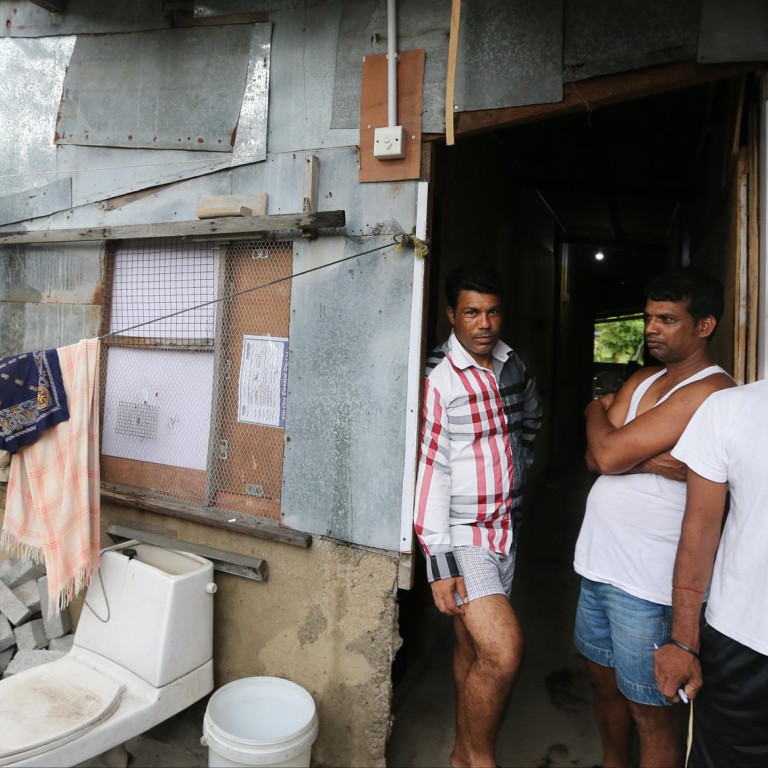
Asylum seekers 'forced to live in pigeon farm'
Government-funded ISS-HK faces probe amid claim refugees have been put in 'shanty town'
A government-funded group is facing investigation over claims it has forced asylum seekers to live in an illegally converted poultry farm described by a rights group as a "degrading slum unfit for human habitation".

A former pigeon shed has been turned into makeshift rooms, held together by flimsy pieces of wood, metal and breeze blocks. Amid the stench of excrement, the lingering smell of a farm persists. There is no drinking water and only cold showers, some of them outdoors. The rent is HK$1,300 a month per person, of which ISS-HK pays the bulk - HK$1,200; the rest is met by other charitable organisations.
The dire conditions at the site in Hung Shui Kiu, just north of Tuen Mun, which was a pigeon farm until late last year, were highlighted on Friday when one of eight asylum seekers from India and West Africa living there was rushed to hospital after drinking contaminated water. Medical staff had to carry the man to the ambulance because there is no vehicular access.
Growing concerns over bird flu on the mainland have also raised fears that living in a not-long-closed poultry farm could be a public health hazard.
Similar concerns have been expressed about another ISS-HK- funded development near Ping Che in the New Territories, which is still home to dozens of asylum seekers.
After being told of the Tuen Mun site - which is on land designated for agricultural use only - officials from the Agriculture, Fisheries and Conservation Department said they would visit it at the "earliest opportunity''.
Asylum-seeker rights group Vision First says it is considering legal action against ISS-HK over the ramshackle buildings.
"It's of concern that these new slums exist," said human-rights barrister and non-executive director of Vision First, Robert Tibbo. "ISS has been proactive in settling asylum seekers in inhuman and dangerous living environments. The ISS have sanctioned them as appropriate places to live.''
ISS-HK denies it has a policy of moving people into slum conditions. Its migrants' programme director, Adrielle Panares, said the payment of rent to landlords was only sanctioned after case workers who inspected a site approved the living conditions as being fit for purpose.
It is unclear who owns the Tuen Mun site. The landlord's identity in Land Registry documents differs from that on documents shown to the by asylum seekers.
Panares said: "If there is anything about the site that could pose a danger to asylum seekers then it needs to be brought to our attention. It's possible the initial visits didn't show a problem. My social workers are not perfect but they are professional. If they have missed out on one thing, asylum seekers should be pushing for change."
However, asylum seekers said they feared speaking up about their conditions because of threats they allege were made by ISS staff, a claim Panares denies.
"Messi", a political refugee from West Africa, claims the ISS forced him to live in the Tuen Mun site after his case worker introduced him to it.
"This area is dehumanising, degrading. It is not fit for a human to live in," he said.
The ISS said one of its employees showed Messi what it could offer on a site visit, but said in a case note on June 3 it did not think it was suitable to live in.
Vision First executive director Cosmo Beatson said: "This [is] ISS slum policy … enough is enough, we need this practice to stop.''
The Lands Department confirmed the land, managed under a block government lease, was marked for agricultural use only and Chow Siu-ngor, an independent real estate lawyer from King & Wood Mallesons, said use of such land for housing was illegal.
ISS-HK chief executive Stephen Yau How-boa, a member of the Central Policy Unit during the Donald Tsang Yam-kuen administration and a veteran of a host of government advisory bodies, was not available for comment.
The government said 4,700 people were receiving assistance from ISS-HK, of whom 3,300 were being housed by the group.
The HK$203 million paid to ISS is intended to cover asylum seekers' rental assistance, a pack of groceries every 10 days and other basic necessities. However, they get no physical access to the cash and are not allowed to work.

